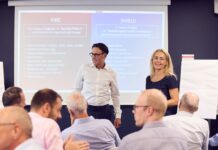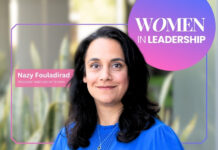An Exclusive Interview with Magdalena Nowicka Mook, Executive Director and CEO, ICF
A professional coaching program has proven to be a powerful catalyst for helping executives as they embark on journeys toward becoming better business leaders. In our interview with Magdalena Nowicka Mook, Executive Director and CEO of the International Coach Federation, she shares with us her own career journey and the powerful impact coaching can have on every aspect of a leader’s personal and professional life.
Thank you for taking the time to talk to us today. Let’s start this interview by giving us a glimpse of what your day looks like as a successful and busy career woman.
Not surprisingly, no two days look exactly alike for me. One part of my routine that I fight to keep consistent is spending time at the beginning of every day catching up on news from around the world. I always ask myself how I can put to work what I learn today to help prepare ICF and the coaching profession for tomorrow.
Because ICF has staff and volunteers around the world, my day often starts and ends on calls or video conferences. I always have my smartphone close at hand, and I’ve really grown to appreciate the ability of web-based video conferencing services, such as Zoom, to support face-to-face conversations across global boundaries.
I’m also passionate about supporting the association management profession. In May 2018, I was named vice chair of the American Society of Association Executives’ (ASAE) International Section Council. ASAE’s International Section works to enhance the international perspective of the association management profession and the international competencies of ASAE members. The Council supports associations by developing and sharing successful practices and solutions. Serving in this capacity is a privilege, and I glean new ideas and insights from every conversation I have with my colleagues and peers who operate in the similar environment of a global association.
Before you joined ICF in 2005, you already had extensive experience in fundraising, development, consulting and association management. How was the transition to ICF? What made you decide to pursue coaching as your lifetime profession?
I was attracted to ICF because of its mission and vision. I’ve also seen the transformative impact of working with a professional coach in my own personal and professional life. In turn, I’ve been able to share that impact with my team and our organisation by taking a coaching approach to leadership. Ultimately, these experiences prompted me to study systemic coaching. Through coach training, I further evolved my leadership style and philosophy. I also gained an even deeper appreciation for the amazing work that ICF Members worldwide do daily.
You have been the CEO/Executive Director of ICF since 2011. What do you find the most rewarding and most challenging in leading such an international organisation? What is your secret to effective leadership?
The most rewarding aspect of my role is partnering with our passionate global community to move coaching forward. The wonderful thing about coaches is that being a “lone wolf” is antithetical to the work we do. This means that everyone – from new members to seasoned leaders serving on the ICF Global Board – agrees that we’re always better together than we could be separately.
Because of our passion, we never have a shortage of new ideas for how to achieve our vision. The global nature of our membership adds to this by offering very diverse opinions and observations. As I said before, no two days look alike!
Hal Gregersen delivered the opening keynote at our ICF Converge event in 2017, and he spoke about the importance of asking the right questions. I agree that asking the right questions at the right time – and listening carefully to the answers – is the key to effective leadership, particularly in a dynamic global organisation like ICF. By asking these questions, I’m able to sharpen my insights around when we say “yes” to a new opportunity, and when the answer may need to be “no” or “not right now”.
Based on your years of experiences working with business leaders from around the world, what do you think are the features of a remarkable leader today?
Good leaders look toward to the future and are comfortable conceiving a grand, audacious vision for what’s next. They need to think beyond what is possible and instead focus on what’s needed. Remarkable leaders have to be able to communicate that bold vision effectively and get the necessary buy-in.
In September 2018, we reported on research that we’d conducted in partnership with the Human Capital Institute on the intersection of change management and coaching. We found that communication is one of the core features on which the success of a change management initiative hinges. When change leaders can clearly and persuasively communicate the vision for change and how it will impact the team, change management initiatives are more likely to succeed. The great news is that, whether you’re an emerging or seasoned leader, communication isn’t a static competency. Coaching is one of the best ways to sharpen your own change communication skills, and making coaching available to your team is one of the best ways to support them in thriving during times of change.
The leaders of the future also have to be inclusive and listen. They need to have an appetite for trying new things and be open to learning from unsuccessful efforts. Most of all, they have to be curious and aware of themselves, systems around them and trends in the marketplace.
As a professional coach yourself, how would you describe a good coach in three words?
A good coach is curious, well-trained and, above all, ethical.
What do you think is the greatest impact a coach can make in the career of her/his client? What is the best feedback/greatest achievement you have received from practicing coaching?
Because coaching is a client-driven process, the greatest impact a coach can make is helping the client get to where they want to be in their lives. For some clients, that may mean overcoming whatever block is keeping them from playing a bigger game in their career. For others, it may mean identifying and implementing new strategies to increase work/life balance and satisfaction. Seeing a client reach his or her goals and knowing that you’ve supported him or her in unlocking that potential is the greatest feedback a coach can receive.
What do you think are the greatest challenges the coaching industry has to combat with in the coming years, and how should those challenges be addressed correspondingly?
According to our 2016 Global Coaching Study, coach practitioners say the No. 1 challenge facing the coaching industry is untrained individuals who call themselves coaches. Because coaching is a self-regulated profession, anyone can call themselves a coach, which creates confusion and concern for the consumer. Regulation is meant to protect consumers and make sure they’re getting what they paid for based on an established set of standards. That’s where ICF comes in: We set the standard for coaching with our Core Competencies, our robust Code of Ethics and our stringent requirements for membership, individual coach credentialing and the accreditation of training programmes. We also have an Ethical Conduct Review process and Independent Review Board that allow consumers to file complaints if they are unsatisfied or if a coach behaves in an ethically questionable manner.
For many years, one of ICF’s challenges as an association was educating the public about the difference between untrained coaches and coaches who meet ICF’s high standards. Recent industry research shows that we’re moving the needle on this: Consumer awareness of coaching and ICF are higher than ever, and consumers recognise the value of partnering with a credentialed coach.
Speaking of challenges, it is a known fact that we are continually grappling with the lack of women in leadership roles across industries. How do you think women can successfully break the glass ceilings?
Not surprisingly, I encourage every woman with leadership aspirations to partner with a coach. We know that coaching increases self-awareness and awareness of one’s own abilities and core competencies. Coaching can also help women learn how to communicate effectively about their skills and accomplishments, navigate personal and professional transitions, and improve their work/life balance.
I’d be remiss if I didn’t note that organisational decision-makers can help facilitate the development of women leaders by nurturing a strong coaching culture that ensures every employee has the tools and support they need to thrive.
When it comes to habits, there is no one-size-fits-all agenda. What are your favourite routines to keep yourself focussed and healthy at and off work?
Daily exercise is a must – even when that means getting creative about how I fit it in! In this role, I travel often, and you’ll usually find me skipping the airport tram or moving walkway in favour of walking. Hotel gyms are my friends! Weather permitting, I also love exploring the cities I’m visiting for business on foot. I average around 10,000 steps per day on my FitBit.
I also do my best to make healthy dining choices whether I’m at home or abroad. I feel better and think more clearly when I’m eating lots of fresh vegetables and lean proteins, and steering clear of dairy and processed foods. Having said that, I am always game for experiencing local food, which gives me an opportunity to meet new friends and learn about the culture.
What does success mean to you? Any message you wish to share with our readers?
At ICF, we’re passionate about coaching because we know that it has the power to transform lives, organisations, communities and the world. Our vision is for coaching to be an integral part of a thriving society, with ICF coaches representing the highest quality of professional coaching. I define success as doing my part to move us closer to this vision daily.
Lastly, we would like to know, what kind of superpower do you have or would like to have? And why?
More hours in the day! That would allow me to connect to ICF’s global community more easily. And that takes me to another superpower I would love to have. Although I speak several languages and can understand a few that I don’t speak, I would love to have the ability to communicate with all of our members in their native tongues.
Thank you very much, Ms. Mook, for sharing your insights with us!
About the Interviewee
 Magdalena Nowicka Mook is the Executive Director and CEO of the International Coach Federation (ICF). She joined the ICF in 2005 and has supported the ICF with extensive experience in fundraising, development, consulting and association management. Previously, Magdalena worked as Assistant Director of National Policy and Director of Development with the Council of State Governments (CSG), a national association of state officials in all three branches of U.S. government. She oversaw the design and implementation of a development strategy for CSG, coordinated policy-specific research and implementation activities, and worked closely with USAID’s US-Asia Environmental Program. Prior to CSG, she served as program manager for the U.S. Department of Agriculture’s Economic Research Service. Magdalena’s formal education includes an M.S. in Economics and International Trade from the Warsaw School of Economics in Poland and completion of the Copenhagen Business School’s Advanced Program in International Management and Consulting. She is also a trained coach through the College of Executive Coaching, and she holds a certificate in the Fundamentals of Systemic Coaching.
Magdalena Nowicka Mook is the Executive Director and CEO of the International Coach Federation (ICF). She joined the ICF in 2005 and has supported the ICF with extensive experience in fundraising, development, consulting and association management. Previously, Magdalena worked as Assistant Director of National Policy and Director of Development with the Council of State Governments (CSG), a national association of state officials in all three branches of U.S. government. She oversaw the design and implementation of a development strategy for CSG, coordinated policy-specific research and implementation activities, and worked closely with USAID’s US-Asia Environmental Program. Prior to CSG, she served as program manager for the U.S. Department of Agriculture’s Economic Research Service. Magdalena’s formal education includes an M.S. in Economics and International Trade from the Warsaw School of Economics in Poland and completion of the Copenhagen Business School’s Advanced Program in International Management and Consulting. She is also a trained coach through the College of Executive Coaching, and she holds a certificate in the Fundamentals of Systemic Coaching.



































